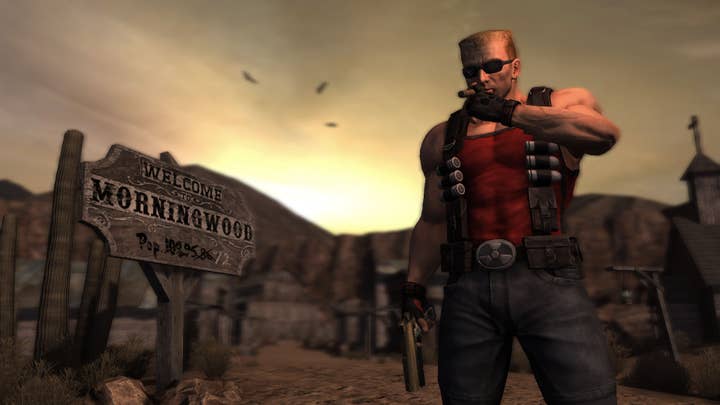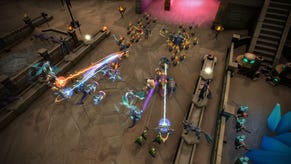Duke Nukem throws a spanner in the Gearbox | 10 Years Ago This Month
Borderlands studio revives Duke Nukem Forever, dooming itself to a decade (and counting) of legal battles
The games industry moves pretty fast, and there's a tendency for all involved to look constantly to what's next without so much worrying about what came before. That said, even an industry so entrenched in the now can learn from its past. So to refresh our collective memory and perhaps offer some perspective on our field's history, GamesIndustry.biz runs this monthly feature highlighting happenings in gaming from exactly a decade ago.
The Curse of Duke Nukem
Gearbox Software seemed to be in a pretty good position heading in 2010.
Borderlands, the original IP the studio had just launched the previous holiday season, was a bonafide hit. The studio also had a much-anticipated first-person shooter based on Aliens in the works with Sega, and the Brothers in Arms franchise was still recent enough to be relevant, even if it hadn't received a new entry in a couple years.
And perhaps best of all, it wasn't constantly involved in a series of lawsuits.
And then Duke Nukem Forever happened.
The essential embodiment of video game development hell, Duke Nukem Forever was the long-awaited follow up to Apogee/3D Realms' 1996 first-person shooter hit Duke Nukem 3D. Forever was announced in 1997, delayed a bunch of times, and eventually saw 3D Realms and original publisher Take-Two Interactive go to court over whether and how the game could possibly be finished.

In June of 2010, 3D Realms and Take-Two settled their dispute, clearing the way for development on the game to continue. There was just the small sticking point that 3D Realms was more a rights-holder than an active studio at that point.
Enter Gearbox, which in September of 2010 announced that it would shepherd the troubled game to completion. And just to make everything neat and tidy, it acquired the Duke Nukem IP from 3D Realms to boot.
Gearbox's Randy Pitchford talked about how Duke Nukem 3D helped launch his career, and how excited he was "to pick up and carry the torch." Pitchford's long-time poker buddy and 3D Realms co-founder George Broussard said it would be "a win-win situation for everyone involved, especially the fans."
At the time, 3D Realms co-founder Scott Miller told the Wall Street Journal what had gone wrong with the original development on Duke Nukem Forever, saying: "We were probably too much of a perfectionist about the game. When some other game had some great feature come out we wanted to match it… We were trying to build a game that was too great."
Gearbox was apparently determined not to make the same mistake. It took the Duke Nukem Forever pieces that 3D Realms had produced and built whatever was needed onto them in order to get the game out the door.
Duke Nukem Forever finally arrived on shelves in June of 2011, in stark defiance of Shigeru Miyamoto's frequently parroted aphorism that "a delayed game is eventually good, but a rushed game is forever bad."
(Gearbox would take another shot at undermining that quote with Aliens: Colonial Marines, which was announced in 2006, released in 2013, and reviewed worse than Duke Nukem Forever. Yet still the Miyamoto quote endures.)
Although it was a critical flop, Duke Nukem Forever still turned a profit for publisher Take-Two Interactive (or at least was on track to be profitable a couple months after launch). 3D Realms believed there was a pie from which it wasn't receiving a proper slice, so in 2013 it sued Gearbox for more than $2 million.
"Perhaps the lesson learned here is to never enter a gaming business deal with a person who has had more lawsuits than shipped games"
A Gearbox representative
In its response, Gearbox said the deal for Duke Nukem Forever had not in fact been a win-win, that 3D Realms "turned out to be the only beneficiary of the deal," and that Gearbox itself "experienced damage to its credibility and loss of its money."
"Perhaps the lesson learned here is to never enter a gaming business deal with a person who has had more lawsuits than shipped games," a Gearbox representative said at the time, pointedly bringing up Apogee/3D Realms' history of court battles and helpfully foreshadowing the rest of this column.
That suit was dropped after only a few months, with Gearbox oddly releasing a statement on Broussard's behalf in which the 3D Realms co-founder called it all a big misunderstanding and expressed regret for any damage done to his and Pitchford's friendship.
However, the two sides would be back in court early the next year, with Gearbox suing to stop development of Duke Nukem: Mass Destruction, a game 3D Realms had teamed with Interceptor Entertainment to make. 3D Realms responded by saying it still had the rights to the Duke Nukem trademark and had licensed the game to Interceptor before the Duke Nukem Forever deal, so Gearbox was asserting rights it didn't actually have.
That fracas was settled as well, with Interceptor giving its game a Duke-ectomy and calling it Bombshell, 3D Realms conceding Gearbox is the sole owner of the IP, and Gearbox refusing to discuss details of the settlement "except to confirm that Gearbox Software is the full and rightful owner of the Duke Nukem franchise."

Duke Nukem rights peace in our time lasted for about four years, until Duke Nukem 3D composer Bobby Prince sued Gearbox for unpaid royalties on the 2016 re-release Duke Nukem 3D: 20th Anniversary World Tour, saying he still owned the original music used in the game because 3D Realms had only ever licensed his work.
Naturally, Gearbox wasn't going to suffer this alone and dragged its dance partner back onto the floor earlier this year, adding 3D Realms to the Prince suit for misrepresenting the rights it could actually give in the original 2010 Duke Nukem acquisition agreement.
We checked back in on that case to give a progress report, and 3D Realms has since filed a countersuit against Gearbox -- at this point it would be rude not to, really -- arguing that the companies' 2015 settlement specifically prohibited Gearbox from suing over anything 3D Realms had done (or not done) prior to that settlement.
When 3D Realms passed the Duke Nukem torch to Gearbox and Pitchford, it may have been passing the "big-name developer with a well-documented history of lawsuits" torch as well.
In addition to everything above, Gearbox has faced a class action lawsuit accusing the studio of misleading consumers about the quality of Aliens: Colonial Marines with pre-launch "gameplay" trailers that misrepresented the final game. That was much less protracted than the Duke Nukem debacle, as Gearbox was dropped from the suit after only a couple years of litigation.
Beyond that, Gearbox traded lawsuits with its own former lawyer, another one-time friend of Pitchford's named Wade Callender. The lawsuits exchanged deeply personal barbs, with the studio accusing Callender of reneging on hundreds of thousands of dollars in loans and running up a tab on the corporate credit card for "family vacations, gun club memberships...and trying to get six-pack abs."
In response, Callender's suit talked about Pitchford losing a USB drive with company secrets and "Pitchford's personal collection of 'underage porn'" at a Medieval Times in Dallas. It also accused him of claiming $12 million in royalties meant for other Gearbox developers, and of hosting parties at his house where men exposed themselves to minors.
There were also allegations actually related to ways Pitchford and Gearbox may have wronged Callender, but at the risk of inferring someone else's motivation, they seemed besides the point of the suit.
Naturally, it was settled, with a joint statement released exonerating Pitchford of wrongdoing, chalking the whole thing up to misunderstandings, and saying that apologies were exchanged.
I'm not saying Duke Nukem is a cursed IP, that whoever holds it is doomed to spend their time embroiled in a series of increasingly absurd court battles, and that we'd all be better off permanently mothballing it along with the pubescent edgelord sensibilities and '90s attitude it embodied. But I'm definitely not not saying that, either.
Things You Might Have Forgotten
● Fox News and IGN sister company Fox Mobile published Big Lebowski and Men in Black mobile games made in North Korea, raising concerns about whether outsourcing development was building up the country's cyber warfare capabilities.
● Microsoft's Xbox Live policies around new content used to be so restrictive and time-consuming that it was headline news when Super Meat Boy's developers figured out a workaround to quickly push new content to the game for free.
● Nintendo announced the release date and price of 3DS almost five full months ahead of the launch.
By all accounts, the PS5, disc-less PS5, and Xbox Series X are hitting shelves in about two months, there's a lot of smoke about an Xbox Series S that hasn't even been announced yet, and we know neither the release date nor the price of any of these four consoles. Not that I'm getting impatient.
● Blockbuster Video -- an institution so thought of as a relic of the distant past it was used as a comedic shorthand for the 1980s in last year's Captain Marvel movie -- declared bankruptcy in the US in September of 2010.
● We've been reading stories claiming Tencent is "the biggest game company you've never heard of" for at least ten years now. There are no indications this will stop any time soon. Seriously, like none.
Obscenity
No, this section isn't about the Supreme Court battle over selling violent games to children, even though that was playing out around this time with scores of medical professionals, legal experts and scientists coming to the industry's defence in amicus briefs arguing their case to the Court.
This is about Facebook CEO Mark Zuckerberg making the Forbes 400 list of the wealthiest Americans with an estimated net worth of $6.9 billion, enough to rank as the 42nd richest person in the country.
We've heard a lot of talk about "the rich getting richer" in the past decade, so let's take a bit of a closer look and see how much truth there is to it.

In Zuckerberg's case, it's absolutely true. In last year's Forbes 400 list, Zuckerberg ranks fourth in the country with an estimated net wealth of $69.9 billion, more than ten times what he had nine years prior.
This year's Fortune 400 hasn't been released yet, but the intervening months and the pandemic have been good to Zuckerberg, as last month his net wealth passed the $100 billion threshold.
And sure, that's just one guy whose business has grown significantly in the past decade, but he's far from alone.
Zuckerberg's $6.9 billion worth was enough for 42nd richest American in 2010, but would only have him tied for 82nd in 2019.
In 2010, it took $1 billion to crack the list of the 400 richest Americans. In 2019, it took $2.1 billion.
It took $54 billion for Bill Gates to top the list in 2010; that would have placed him seventh last year. Jeff Bezos' $114 billion was the high mark in 2019, and he will undoubtedly top the list again this year as his net worth has swollen to more than $200 billion.
Good Call, Bad Call
GOOD CALL: Valve boss Gabe Newell insisted he wouldn't take the company public, which is a position he seems to have been steadfast on. It's kind of unfortunate, because at least a publicly traded Valve would probably do more to moderate its platform, both in terms of the behavior of its customers and the games it tries to profit from.
BAD CALL: Sony plays it safe by telling people the already long-awaited The Last Guardian won't be making it to launch in the upcoming holiday season, but it's planning for a Christmas 2011 launch.
The game would indeed launch in time for Christmas... of 2016.
GOOD BUT WEIRD CALL: Capcom's R&D head Keiji Inafune said Canada is on the rise as a development hub, thanks to government assistance, a lower cost of living compared to the US, and because "from the developers' point of view, Canada is part of North America so you can sort of [include it as] North American."
[looks at map]
Yeah, this one checks out.
BAD AND WEIRD CALL: Inafune was busy making headlines that month, telling the New York Times that the Japanese game industry was in a rut.
"I look around Tokyo Games Show, and everyone's making awful games; Japan is at least five years behind"
Keiji Inafune
"I look around Tokyo Games Show, and everyone's making awful games; Japan is at least five years behind," he said. "Capcom is barely keeping up. The ideas, game play, design - there's no diversity, no originality… I want to study how Westerners live, and make games that appeal to them."
With full acknowledgement that this is all subjective and Inafune can like or not like whatever he wants and that's perfectly valid, it's not difficult to build a case for the Japanese gaming scene of the era.
Inafune himself had just executive produced the excellent Ghost Trick: Phantom Detective that year, and 2010 also saw Japanese-developed releases like Vanquish, Bayonetta, Nier, and Super Mario Galaxy 2.
That list gets a little shorter if you want to judge game quality by commercial success and influence instead of critical acclaim, but even then Inafune wasn't far removed from 2009, which saw From Software usher in a new breed of action game with Demon's Souls and Capcom itself reinvigorate a mostly moribund fighting genre with Street Fighter IV. (Not to mention the original Japanese releases of 3D Dot Game Heroes and Dragon Quest IX...)
As for what Western paradigms of originality Inafune might have been thinking of, 2010's best-sellers in the US did include the first Just Dance and Red Dead Redemption, as well as Madden, NBA 2K, spin-offs for Halo and Assassin's Creed, and two Call of Duty titles.
BAD CALL: Bobby Kotick floated some ideas to shareholders about how the company could be more profitable, suggesting that it could do more with the frequently praised cutscenes Blizzard made for games like Starcraft.
"If we were to take that hour, or hour and a half, take it out of the game, and we were to go to our audiences -- for whom we have their credit card information and a direct relationship -- and say to them, 'Would you like to have the Starcraft movie?'... at a $30 or $20 price point, you'd have the biggest opening weekend of any film ever. Within the next five years you are likely to see us do that."
That's a great idea, Bobby, except that Blizzard already did that in 2001. And 2002. I don't have numbers handy, but if you weren't even aware they existed, I'm guessing they did not exceed the opening weekend record, which at the time of his comments would have been The Dark Knight's 2008 debut of $158 million, according to Box Office Mojo.
WORST CALL: Retro gaming storefront GOG.com unexpectedly shut down with a somber end-of-the-line message, saying, "We're closing down the service and putting this era behind us as new challenges await."
With the site down, it also left customers unable to redownload any games they had deleted from their computers.
Two days later, GOG.com co-founder Marcin Iwinski and managing director Guillaume Rambourgthe admitted it was a marketing stunt to promote a revamped version of the site and the addition of Baldur's Gate to its catalog. They also offered a half-hearted apology that was paired with a dig at the games press for taking their announced shutdown seriously and then being upset that it was just a lie to trick them into covering the relaunch.
Incidentally, here's Iwinski in a 2013 Gamasutra interview talking about the danger of short-term thinking and how companies that succeed "follow their values and are honest with the gamer." Maybe he had a change of heart.
GOOD CALL: I know conventional wisdom says you should never read the comments, but Teeside University lecturer and GamesIndustry.biz reader Antony Cain made a very good point in the comments of this story about how women only make up 4% of the UK games industry. Antony noted that our site's default avatar logo is a silhouette most people would consider male, which is exactly the sort of thoughtless assumption that tells women this place and this industry aren't meant for them.
That's bunk, and we've asked the tech team to change the default avatar image. Thanks Antony, and sorry to everyone for the decade-long delay in acting on the suggestion.









